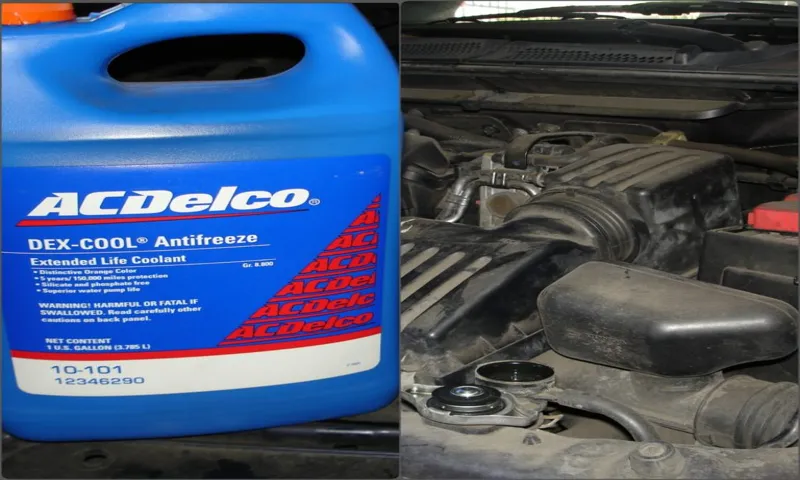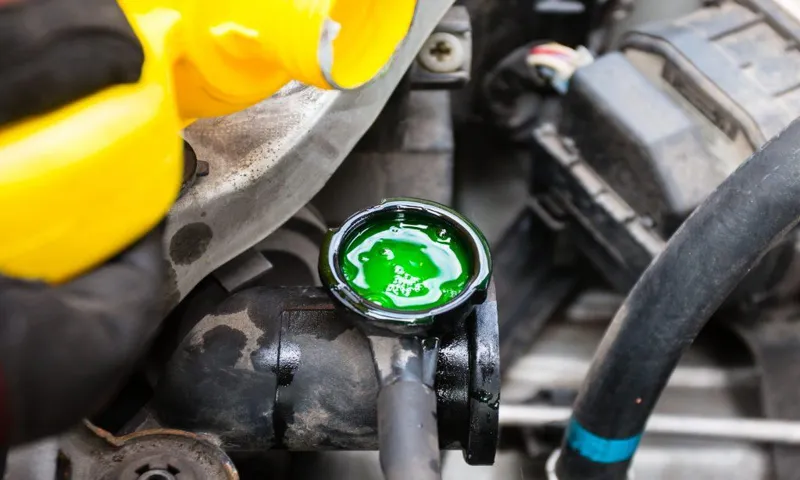Have you ever wondered how often you should replace your engine coolant? Maintaining the right coolant level is crucial in keeping your car’s engine running smoothly and efficiently. Similar to how our bodies need water to stay hydrated, the engine needs coolant to prevent overheating. Engine coolant, also known as antifreeze, plays a vital role in regulating the engine’s temperature and preventing corrosion.
Think of the coolant as your engine’s personal bodyguard, constantly shielding it from extreme temperatures and harmful elements. However, just like any superhero, the coolant can only do its job effectively for a certain period of time before it starts losing its protective superpowers. So, how often should you replace engine coolant? While there is no one-size-fits-all answer, it is generally recommended to replace the coolant every two to five years, depending on the type of coolant and your driving habits.
Over time, the coolant can become contaminated with debris, rust, and other contaminants, which can impair its ability to regulate temperature and protect against corrosion. Regularly replacing your engine coolant not only helps prevent overheating but also prolongs the life of your engine. By maintaining your coolant’s integrity, you reduce the risk of costly repairs and engine damage caused by overheating.
It’s also crucial to check your coolant level regularly. If you notice a sudden drop in coolant level or see signs of leakage, it’s essential to have it checked by a professional. Ignoring coolant leaks can lead to a loss of coolant, which can result in engine damage or even complete engine failure.
In conclusion, replacing your engine coolant on a regular basis is essential for keeping your engine running optimally. By following the recommended replacement intervals and staying vigilant for signs of coolant leakage, you can ensure your engine remains cool and protected for years to come.
Table of Contents
What is engine coolant and why is it important?
Engine coolant, also known as antifreeze, is a fluid that circulates through the engine of a vehicle to regulate its temperature. It helps prevent the engine from overheating by absorbing and dissipating excess heat generated during operation. Engine coolant is typically a mixture of water and some form of ethylene or propylene glycol, which lowers the freezing point and increases the boiling point of the liquid.
This is important because it allows the coolant to remain effective in extreme temperatures, whether it’s the scorching heat of summer or the freezing cold of winter. Regularly replacing engine coolant is crucial for maintaining the health and performance of your vehicle. Over time, the coolant can become contaminated with rust, debris, and other particles that can clog the cooling system and impede its ability to function properly.
Additionally, the additives in the coolant that help prevent corrosion can break down over time, leaving the engine vulnerable to rust and other damage. The frequency of coolant replacement varies depending on the make and model of your vehicle, so it’s best to refer to your car’s owner’s manual or consult with a mechanic to determine the recommended interval. In general, it is recommended to replace the coolant every 30,000 to 50,000 miles or every 2 to 5 years.
However, if you notice any signs of coolant leakage, overheating, or a sweet smell coming from the engine, it’s important to have your coolant checked and potentially replaced sooner to avoid any further damage to your vehicle’s engine. Replacing the coolant at regular intervals not only helps ensure your engine stays cool and protected but also prolongs the overall lifespan of your vehicle.
What is engine coolant?
engine coolant Engine coolant, also known as antifreeze, is a crucial component for the proper functioning of a vehicle’s engine. It is a liquid that circulates throughout the engine to help regulate its temperature and prevent it from overheating. Coolant is typically a mixture of water and additives, such as ethylene glycol or propylene glycol, that help to lower the freezing point and raise the boiling point of the liquid.
This ensures that the coolant can withstand extreme temperatures without freezing in cold weather or boiling over in hot conditions. One of the primary functions of engine coolant is to absorb and dissipate heat generated by the engine. As the coolant circulates through the engine, it absorbs heat from the combustion process and carries it away to the radiator.
In the radiator, the heat is dissipated into the surrounding air, allowing the coolant to cool down before returning to the engine. This continuous cycle helps to keep the engine at an optimal temperature and prevents it from overheating. In addition to regulating temperature, engine coolant also provides protection against corrosion and cavitation.
Corrosion can occur when the coolant interacts with the metal components of the engine, leading to the formation of rust and other damaging compounds. Coolant contains additives that inhibit corrosion and protect the engine’s components from damage. Cavitation, on the other hand, is the formation of tiny bubbles or pockets of low pressure within the cooling system.
These bubbles can cause erosion and pitting on the surface of the engine components. Coolant contains additives that help prevent cavitation and maintain the integrity of the cooling system. In summary, engine coolant is an essential fluid that helps to regulate the temperature of a vehicle’s engine, protect it from corrosion, and prevent cavitation.
Without proper coolant, the engine can overheat, leading to potential damage and even engine failure. It is important to regularly check the coolant levels and quality and to follow the manufacturer’s recommendations for coolant flushes and replacements. By taking care of the engine coolant, you can ensure the longevity and optimal performance of your vehicle’s engine.

Why is engine coolant important?
engine coolant, importance of engine coolant Engine coolant is a fluid that is essential for the proper functioning of a vehicle’s engine. It is typically a mixture of water and antifreeze, which helps regulate the temperature of the engine and prevents it from overheating. But why exactly is engine coolant so important? Well, for starters, the engine generates a significant amount of heat while it is running.
Without proper cooling, this heat can cause serious damage to the engine components, leading to costly repairs or even engine failure. Engine coolant helps to dissipate this heat and maintain the engine’s temperature within a safe range. Additionally, coolant also helps to prevent the engine from freezing in cold temperatures, which can lead to cracked engine blocks and other issues.
So, whether you’re driving in scorching summer heat or freezing winter temperatures, having the right amount and quality of engine coolant is crucial for the overall health and performance of your vehicle’s engine. Don’t overlook the importance of engine coolant – it could save you from a lot of headaches and expensive repairs down the road.
Signs that your engine coolant needs to be replaced
Engine coolant is an essential component in keeping your vehicle’s engine running smoothly and preventing it from overheating. But how often should you replace your engine coolant? Well, there are a few signs to look out for that indicate it may be time for a coolant replacement. One common sign is if you notice that your engine is running hotter than usual.
This can be an indication that the coolant is no longer effectively cooling the engine and needs to be refreshed. Another sign to watch for is if you see any signs of coolant leaks under your car. If you notice puddles of coolant forming underneath your vehicle, it’s likely that there is a leak in the system and the coolant level needs to be topped up or the coolant needs to be replaced altogether.
Additionally, if you notice any changes in the color or consistency of your coolant, it may be time for a replacement. Coolant should typically be a bright, vibrant color, so if it appears dirty or discolored, it’s a good idea to have it checked and potentially replaced by a professional. Overall, it’s recommended to have your engine coolant checked and potentially replaced every 2 to 5 years, depending on the manufacturer’s recommendations and how often you drive your vehicle.
The importance of regular coolant changes
The importance of regular coolant changes cannot be overstated when it comes to maintaining a healthy and efficient engine. Engine coolant, also known as antifreeze, is responsible for regulating the temperature of your engine by absorbing heat generated during combustion and preventing it from reaching dangerous levels. Over time, however, coolant can become contaminated with rust, sediment, and other debris, which can hinder its ability to perform effectively.
That’s why it’s crucial to keep an eye out for signs that your engine coolant needs to be replaced. One common indicator is a decrease in coolant levels. If you notice that you’re consistently having to top off your coolant, it may be a sign that there is a leak or that the coolant is not circulating properly.
Another sign is a change in the color or consistency of the coolant. If it appears murky, discolored, or has a sludgy texture, it’s time for a coolant change. Additionally, if you start to notice any overheating issues or strange smells coming from your engine, it’s essential to have your coolant checked as soon as possible.
By regularly maintaining and replacing your coolant, you can ensure that your engine stays cool, preventing overheating and other costly repair issues down the line. So, don’t neglect your coolant – keep an eye out for these signs and make sure to schedule regular coolant changes to keep your engine running smoothly.
Signs that your engine coolant needs to be replaced
engine coolant, signs, replaced
How often should you replace engine coolant?
Have you ever wondered how often you should replace your engine coolant? Well, the answer may vary depending on your specific vehicle and driving conditions. As a general rule of thumb, it is recommended to replace engine coolant at least every two years or every 30,000 to 50,000 miles. However, it’s important to consult your vehicle’s owner manual for the manufacturer’s recommendations.
Regularly replacing your engine coolant is essential for maintaining the optimal performance and longevity of your engine. Coolant helps to regulate the temperature of the engine and prevent it from overheating. Over time, the coolant can become contaminated with dirt, debris, and corrosion, which can reduce its effectiveness and potentially lead to engine damage.
Regular coolant replacements also ensure that the system is properly flushed and free from any buildup or blockages. So, don’t neglect your engine coolant maintenance – it’s a small investment that can save you from costly repairs down the road.
Factors that affect coolant lifespan
“How often should you replace engine coolant?” Engine coolant, also known as antifreeze, is an essential component of your car’s cooling system. It helps regulate the engine temperature and prevents it from overheating. But just like any other fluid in your vehicle, coolant has a limited lifespan.
So, how often should you replace it? Well, there are a few factors that can affect the lifespan of your engine coolant. Firstly, the type of coolant you use can play a role. Different types of coolant have different lifespans, so it’s important to consult your vehicle’s manual or talk to a mechanic to determine the specific recommendations for your car.
Generally, conventional coolants need to be replaced every 2 years or 30,000 miles, while long-life or extended-life coolant can last up to 5 years or 150,000 miles. Secondly, the conditions in which you drive can also affect the lifespan of your coolant. If you frequently drive in extreme temperatures or under heavy loads, your coolant may degrade more quickly.
This is because the coolant is working harder to keep the engine cool and may break down faster as a result. Additionally, the quality of the coolant and the condition of your cooling system can impact its lifespan. If you use a high-quality coolant and regularly maintain your cooling system, your coolant may last longer.
On the other hand, if you neglect maintenance or use low-quality coolant, it may need to be replaced more often. Lastly, it’s important to pay attention to any signs of coolant degradation. If you notice that your coolant is discolored, has a strong odor, or contains debris, it’s a clear indication that it needs to be replaced.
Ignoring these signs can lead to engine damage and costly repairs. In conclusion, there isn’t a one-size-fits-all answer to how often you should replace engine coolant. It depends on factors such as the type of coolant, driving conditions, coolant quality, and the condition of your cooling system.
General recommendations for coolant replacement
engine coolant, replace coolant, coolant replacement, coolant service, vehicle maintenance. If you want to ensure that your engine runs smoothly and efficiently for years to come, replacing the engine coolant regularly is a must. Engine coolant, also known as antifreeze, plays a crucial role in maintaining optimal engine temperature and preventing overheating.
Over time, coolant can become contaminated with dirt, debris, and chemicals that can hinder its performance. That’s why it’s important to replace the coolant at regular intervals as advised by the manufacturer or your trusted mechanic. Generally, coolant should be replaced every 2 to 5 years, depending on the type of coolant used and the specific needs of your vehicle.
However, it’s always a good idea to consult your owner’s manual or seek advice from a professional to determine the exact replacement interval for your vehicle. Regular coolant replacement not only keeps your engine cool but also helps prevent corrosion and damage to vital engine components. So, don’t overlook the importance of this routine maintenance task and make sure to schedule a coolant service to keep your engine in top shape.
How to replace engine coolant
If you’re wondering how often you should replace your engine coolant, the answer depends on several factors. Generally, it is recommended to replace the coolant every 30,000 to 50,000 miles or every five years, whichever comes first. However, it’s always a good idea to check your vehicle’s owner manual for the manufacturer’s recommended interval.
Engine coolant, also known as antifreeze, plays a crucial role in maintaining your engine’s temperature and preventing it from overheating. Over time, coolant can become contaminated or lose its effectiveness, which can lead to engine damage or failure. Regularly replacing your engine coolant helps ensure that your engine stays cool and runs smoothly.
If you’re unsure about when to replace your coolant, don’t hesitate to consult with a professional mechanic who can provide you with the best advice based on your vehicle’s make and model.
Step-by-step guide to replacing engine coolant
engine coolant replacement, replace engine coolant, step-by-step guide, engine maintenance, cooling system, radiator, overheating, car maintenance, flush coolant Is your car’s engine running hotter than usual? Has it been a while since you last replaced the engine coolant? If so, it’s time to consider giving your cooling system some much-needed attention. Engine coolant, also known as antifreeze, plays a crucial role in maintaining your engine’s temperature and preventing it from overheating. Over time, coolant can become contaminated with dirt, rust, and other debris, which can affect its ability to perform its job effectively.
To ensure optimal engine performance and prevent any potential damage, it’s important to replace the coolant regularly. Here is a step-by-step guide to help you replace your engine coolant and keep your car running smoothly. First, make sure your engine is cool before attempting to replace the coolant.
Working with a hot engine can be dangerous, as the coolant can be under pressure, leading to the risk of burns. Once the engine has cooled down, locate the radiator – it is usually located at the front of your engine and can usually be identified by its cap. Using caution, remove the radiator cap and set it aside.
Next, locate the drain valve on the bottom of the radiator. Place a catch pan or bucket underneath to catch the old coolant as it drains out. Open the valve and allow the coolant to drain completely.
This may take a few minutes, so be patient. Once all the coolant has drained out, close the drain valve securely. Now it’s time to flush out the cooling system.
Use a coolant flush solution mixed with water according to the manufacturer’s instructions and pour it into the radiator. Replace the radiator cap and start the engine. Let it run for about 10 minutes or as directed by the product instructions.
Tips for a successful coolant replacement
engine coolant replacement, successful coolant replacement
Conclusion
When it comes to replacing engine coolant, timing is everything. Just like in the world of fashion, you wouldn’t want to hold onto that outdated outfit from the 90s any longer than necessary. Similarly, clinging onto old coolant is like trying to rock a mullet in the modern age – it’s simply not going to fly.
Engine coolant is responsible for keeping your engine cool, and just like your favorite ice cream on a hot summer day, it needs to be fresh and rejuvenating. So, how often should you replace engine coolant? Well, think of it this way – you wouldn’t want to drink expired milk, would you? The same principle applies to coolant. Over time, it becomes less effective at its job of maintaining optimal engine temperature.
It can become contaminated with debris, rust, and other unsavory elements, much like that forgotten sandwich lurking in the back of your fridge. But fear not, for there is a solution! Most car manufacturers recommend replacing engine coolant every 30,000 to 50,000 miles, or roughly every two to three years. This ensures that your engine stays as cool as a cucumber, even during those blistering summer road trips.
So, don’t be a coolant hoarder. Keep your engine fresh and revitalized with regular coolant replacements. Your engine will thank you, and you’ll be driving around with a confident swagger, knowing that you’ve got the coolest (pun intended) engine in town!”
FAQs
How often should I replace my engine coolant?
It is recommended to replace engine coolant every 2-5 years or as specified in your vehicle’s owner manual.
What happens if I don’t replace my engine coolant regularly?
If you don’t replace your engine coolant regularly, it can lead to overheating, engine damage, and potential breakdowns.
Can I replace my engine coolant on my own, or do I need to take it to a professional?
You can replace your engine coolant on your own, but if you’re not familiar with the process or don’t have the necessary tools, it’s best to take it to a professional mechanic.
What are the signs that my engine coolant needs to be replaced?
Signs that your engine coolant needs to be replaced include overheating, coolant leaks, a sweet smell inside the car, and discolored coolant.
Is it necessary to use a specific type of coolant for my vehicle?
It is important to use the coolant recommended by your vehicle manufacturer as different vehicles may require different types of coolant.
Can I mix different types of coolant in my engine?
It is generally not recommended to mix different types of coolant as it can lead to reduced performance and potential damage to your engine.
How can I check the level of my engine coolant?
You can check the level of your engine coolant by locating the coolant reservoir, which is usually marked with high and low levels.
Can I reuse the engine coolant that I drained from my vehicle? A8. It is not recommended to reuse drained engine coolant as it may contain contaminants and lose its effectiveness over time.
Why is it important to have the correct amount of engine coolant in the system?
Having the correct amount of engine coolant is important for maintaining proper temperature control and preventing engine overheating.
Can engine coolant freeze in cold weather?
Engine coolant can freeze in extremely cold temperatures, which can cause damage to the engine block and other components.
Is it normal for my engine coolant to gradually decrease over time?
It is normal for engine coolant to gradually decrease over time due to evaporation. However, significant changes may indicate a leak or other issues.
Can engine coolant affect the performance of my vehicle?
Yes, engine coolant plays a crucial role in maintaining the optimal operating temperature of your vehicle’s engine, which directly impacts performance.



